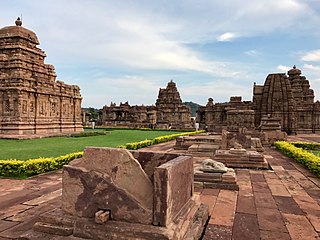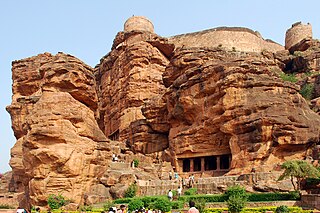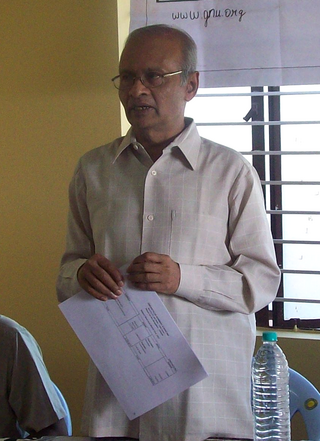
Karnataka, formerly Mysore State, is a state in the southwestern region of India. It was formed as Mysore State on 1 November 1956, with the passage of the States Reorganisation Act, and renamed Karnataka in 1973. The state was part of the Carnatic region in British terminology. Its capital and largest city is Bengaluru (Bangalore).

Kannada, previously also known as Canarese, is a Dravidian language spoken predominantly by the people of Karnataka in southwestern India, with minorities in all neighbouring states. It has around 44 million native speakers, and is additionally a second or third language for around 15 million non-native speakers in Karnataka.

The Kannada script is an abugida of the Brahmic family, used to write Kannada, one of the Dravidian languages of South India especially in the state of Karnataka. It is one of the official scripts of the Indian Republic. Kannada script is also widely used for writing Sanskrit texts in Karnataka. Several minor languages, such as Tulu, Konkani, Kodava, Sanketi and Beary, also use alphabets based on the Kannada script. The Kannada and Telugu scripts share very high mutual intellegibility with each other, and are often considered to be regional variants of single script. Other scripts similar to Kannada script are Sinhala script, and Old Peguan script (used in Burma).

Tulu is a Dravidian language whose speakers are concentrated in Dakshina Kannada and in the southern part of Udupi of Karnataka in south-western India and also in the northern parts of the Kasaragod district of Kerala. The native speakers of Tulu are referred to as Tuluva or Tulu people and the geographical area is unofficially called Tulu Nadu.

Vidhana Soudha in Bangalore, India, is the seat of the state legislature of Karnataka. It is constructed in a style described as Neo-Dravidian, and incorporates elements of various Dravidian styles. Construction was started in 1952 and completed in 1956.

Badami, formerly known as Vātāpi, is a town and headquarters of a taluk by the same name, in the Bagalkot district of Karnataka, India. It was the regal capital of the Badami Chalukyas from 540 to 757. It is famous for its rock cut monuments such as the Badami cave temples, as well as the structural temples such as the Bhutanatha temples, Badami Shivalaya and Jambulingesvara Temple. It is located in a ravine at the foot of a rugged, red sandstone outcrop that surrounds Agastya lake.

The History of Karnataka goes back several millennia. Several great empires and dynasties have ruled over Karnataka and have contributed greatly to the history, culture and development of Karnataka as well as the entire Indian subcontinent. The Chindaka Nagas of central India Gangas, Rashtrakutas of Manyakheta, Chalukyas of Vengi, Yadava Dynasty of Devagiri were all of Kannada origin who later took to encouraging local languages.
Karnataka has been a leading state in electronic communications, in India, since the start of first private radio station in Mysore, in 1935.

The Kannada language has come a long way in the computing field starting from initial software related to desktop publishing to portals and internet applications in the current age. Kannada is the official language of the state of Karnataka in India whose capital city of Bangalore is known as the Silicon Valley of India. Kannada also entered the Wikipedia world when Kannada Wikipedia was started in September 2004.

Chikkaballapura district is a district in the state of Karnataka, India. On 23 August 2007, it was carved out of the pre-existing Kolar district which was the fourth largest district of Karnataka by moving the talukas of Gauribidanur, Gudibanda, Bagepalli, Chikballapur, Manchenahalli, Sidlaghatta and Chintamani into the new district. Kannada is the official language.

Ganjam Venkatasubbiah, also known as G. V., was a Kannada writer, grammarian, editor, lexicographer, and critic who compiled over eight dictionaries, authored four seminal works on dictionary science in Kannada, edited over sixty books, and published several papers. Recipient of the Kannada Sahitya Akademi Award and the Pampa Award, Venkatasubbiah's contribution to the world of Kannada Lexicography is vast. His work Igo Kannada is a socio-linguistic dictionary which encompasses an eclectic mix of Kannada phrases, usages, idioms, and serves as a reference for linguists and sociologists alike.

K. Chidananda Gowda is an Indian academic who served as the Vice-Chancellor of the Kuvempu University, which is located in the state of Karnataka, India. He is also the son-in-law of the Kannada Poet, Kuvempu, after whom the Kuvempu University is named. He has published many papers, mainly in the field of pattern recognition.
Old Kannada or Halegannada is the Kannada language which transformed from Purvada halegannada or Pre-old Kannada during the reign of the Kadambas of Banavasi.
Karnataka is a state in the southern part of India. It was created on 1 November 1956, with the passing of the States Reorganisation Act. Karnataka is bordered by the Arabian Sea to the west, Goa to the north-west, Maharashtra to the north, Telangana and Andhra Pradesh to the east, Tamil Nadu to the south-east, and Kerala to the south-west. The state covers an area of 74,122 sq mi (191,976 km2), or 5.83% of the total geographical area of India. It comprises 30 districts. Kannada is the official language of Karnataka and as per the 2011 census is the mother tongue of 66.5% of the population. Various ethnic groups with origins in other parts of India have unique customs and use languages at home other than Kannada, adding to the cultural diversity of the state. Significant linguistic minorities in the state in 2011 included speakers of Urdu (10.8%), Telugu (5.8%), Tamil (3.5%), Marathi (3.4%), Hindi (3.2%), Tulu (2.6%), Konkani (1.3%) and Malayalam (1.3%).
Shimoga Airport, also known as Shivamogga Airport, officially renamed as Rashtrakavi Kuvempu Airport, is a domestic airport serving the city of Shimoga, Karnataka, India. It is located at Sogane, 8.8 km (5.5 mi) from Shimoga and 8.2 km (5.1 mi) from Bhadravathi. The airport was to be built under Public–Private Partnership (PPP) with the Government of Karnataka. However, due to delays in project execution, the contract was terminated in January 2015. On 15 June 2020, the Chief Minister of Karnataka, B. S. Yediyurappa, laid the foundation stone to start the construction of the airport at a cost of ₹ 4.5 billion. The airport is to be constructed in two phases, out of which the first phase was inaugurated on 27 February 2023 by Prime Minister, Narendra Modi. It is named after Kuvempu, who is regarded as the greatest Kannada poet of the 20th century.

The Kalleshvara temple is located in the town of Ambali in Bellary district of Karnataka state, India. According to an Old Kannada inscription placed in the sabhamantapa, the temple was constructed during the reign of the Western Chalukya Empire King Vikramaditya VI. This temple is protected as a monument of national importance by the Archaeological Survey of India.

About 25,000 inscriptions found in Karnataka and states near by belongs to Kannada rulers like Kadambas, Western Ganga Dynasty, Rashtrakuta, Chalukya, Hoysala and Vijayanagara Empire. Many inscriptions related to Jainism are unearthed. The inscriptions generally found are on stone (Shilashasana) or copper plates (Tamarashasana). The Kannada inscriptions found on historical Hero Stone, coin and temple wall, piller, tablet and rock edict. These Inscription have contributed towards Kannada literature and helped to classify as Proto Kannada, Pre Old Kannada, Old Kannada, Middle Kannada and New Kannada. Inscriptions depicts culture, tradition and prosperity of those era. The worldwide recognized literature Ramayana and Mahabharata are transferred through generation by these Inscription Hazara Rama Temple and Aranmula Parthasarathy Temple are the best example.

Bangalore, officially Bengaluru, is the capital and largest city of the southern Indian state of Karnataka. It has a population of more than 8 million and a metropolitan population of around 11 million, making it India's third most populous city and fifth most populous urban agglomeration, as well as South India's second-largest urban agglomeration, and the 27th largest city in the world. Located on the Deccan Plateau, at a height of over 900 m (3,000 ft) above sea level, Bangalore has a pleasant climate throughout the year, with its parks and green spaces earning it the reputation of India's "Garden City". Its elevation is the highest among India's major cities.

Kampalapura Veeranna Narayana, also known as KVN, is an Indian linguist, professor of Kannada language and literature, and a literary critic. He is currently the Chairman of the Kuvempu Bhasha Bharathi Pradikara, Government of Karnataka. He hails from Piriyapattana in Mysore district. During his time as a professor in Bangalore University, he initiated investigations into Kannada language and culture from the root level. He served as the registrar of Hampi Kannada University. His major areas of interest are Kannada language, literature, teaching and science.













